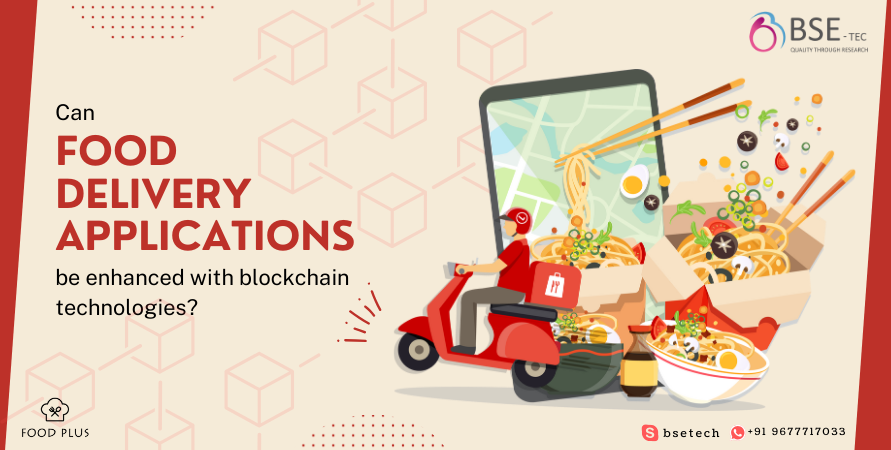Can food delivery applications be enhanced with blockchain technologies?

Food delivery applications have witnessed a significant increase in both users and profits for food delivery platforms in recent years. This growth can be segmented into various factors such as convenience, ease of use, and a wide range of food choices. The rise of on-demand delivery services has also played a crucial role in the success of these applications. Can these food delivery applications Foodplus be enhanced with Blockchain technologies?
Yes, food delivery applications can be enhanced with blockchain technologies. Blockchain can provide transparency, security, and efficiency to the food delivery process. The most common features in food delivery applications like Ubereats, and Doordash are, creating sandwich communication between Restaurants, Users and the dasher (delivery agent) by providing a list of choices for foods to users and now making more impressive online food delivery reached its own popularity in the market, but there are few aspects where blockchain can be implemented to append the frequent suggestion shared by valuable customers of food delivery apps likely,
1. Quality of food
2. Payment methods
3. Allergic
Here are a few ways blockchain can enhance a food-delivering application:
- Quality of food in food delivery applications : Blockchain can track and trace the entire supply chain of food in the blockchain based food delivery application, ensuring transparency and authenticity. It can provide information about the origin of the ingredients, the production process, the recording and verifying of the temperature, storage conditions, and handling procedures during transportation—details, allowing customers to make informed choices. Blockchain can help in maintaining food safety in the food delivery application by ensuring that the food is delivered in compliance with safety regulations and reduces the risk of contamination. Blockchain can enable the use of smart contracts in the food delivery application, which are self-executing contracts with predefined conditions. Smart contracts can automate various processes in the blockchain based food delivery application, such as delivery confirmation, tracking of food, started, prepared, dasher picked and customer reviews, loyalty or reward points, reducing the need for intermediaries and enhancing efficiency.
- Payment methods in food delivery applications: Blockchain can provide a secure and transparent payment system by using cryptocurrencies or digital tokens. The food delivery business has been updating its payment mode with the use of crypto payments, As of now Food Delivery applications inherit UPI, and online banking, so start implementing crypto payments to your blockchain based food delivery application, as this eliminates the need for traditional payment methods and reduces the risk of fraud or chargebacks. In fact, online banking can result in fraud in terms of phishing websites, also UPI can fail when transactions happen but blockchain overcomes these scenarios effectively.
- Allergen Tracking food delivery application: Many people have food allergies or dietary restrictions. Blockchain can be used to track and record information about allergens present in the ingredients used for preparing the food. This helps customers to make informed decisions while ordering and reduces the risk of allergic reactions. Assume, there is a customer A who has placed a food order using online food ordering delivery software, but customer A has some allergic conditions, so quite commonly,
- Customer A contacts the Online food delivery applications support team.
- Support Team checks with Customer A order placed restaurant.
- Restaurants ensure to check.
This happens in a manual pattern but when you have a blockchain in the food delivery application, Smart contracts can be implemented on the blockchain to automate the verification and enforcement of dietary restrictions. These contracts can contain predefined rules and conditions, allowing individuals to set their dietary preferences or allergies. When a product is scanned or purchased, the smart contract can instantly verify if it meets the individual’s requirements and provide a warning if any allergens are present. Also, blockchain enables decentralized data storage, eliminating the need for a central authority to manage and control allergen information. Formation about food products, ingredients, and potential allergens can be stored on the blockchain along with your food delivery application, ensuring that it is accessible to all relevant parties, including consumers, manufacturers, and regulatory authorities.
Overall, integrating blockchain technologies into a food-delivery application can enhance trust, security, and efficiency in the delivery process, benefiting both the customers and the businesses involved. Where can you develop your blockchain based food delivery application? Let me introduce the best food delivery app development company BSEtec – a leading blockchain development company that adds the next layer by implementing blockchain to the food delivery application script, Foodplus – a product of the food delivery application from BSEtec.
Did you find this article useful? Let us know by leaving a comment below, or join us on Twitter and Facebook.




